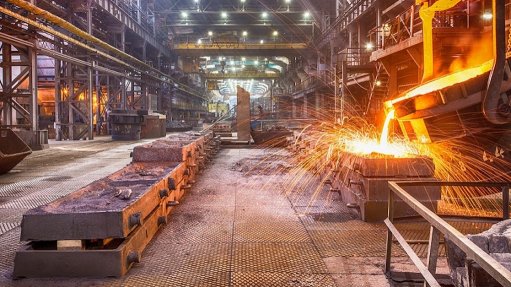
The use of local stainless steel is crucial to driving demand and the subsequent beneficiation of this highly prized metal but work still needs to be done to cement the correct specifications of South African stainless steel components in key strategic projects.
This is the view of the Southern African Stainless Steel Development Association (Sassda) which together with the local demand-creating structures of the Steel Master Plan (SMP) has identified and placed a focus on the following projects that can positively impact the local conversion of stainless steel.
Sassda Executive Director Michel Basson reports “Unfortunately, these exports have declined by around a third since 2018 due to importation restrictions. While the industry still faces this challenge, the primary drivers in the past year have been the automotive industry, the food and beverage sector, and general engineering products.”
Looking ahead, Sassda anticipates that the major drivers for stainless steel consumption in the next 6 to 12 months will be the ongoing demand in active sectors such as food and beverage and the local automotive industry. Additionally, increased demand from construction activities in mining, water, and transport infrastructure is expected.
The industry is also counting on projects outlined in the Steel Master Plan, like Eskom transmission towers and rural steel bridges, where utility stainless steel, particularly 3CR12, can be used to lower life cycling costs associated with other metals.
Unlocking potential of local stainless steel
While the localisation of products such as hollowware and beer kegs can create jobs, Sassda's mandate goes beyond that. The primary goal is to increase the volume of stainless steel used locally. The construction sector, long regarded as the backbone of the local steel industry, plays a pivotal role in driving local consumption.
With 3CR12 stainless steel included in national standards for specific structural applications, state-owned enterprises like Transnet and Eskom have a compelling reason to specify stainless steel in their projects. This not only enhances local capacity for producing structural profiles but also opens new markets in the construction of mining, water, and related infrastructure projects, not only in South Africa but across the African continent.
"By creating awareness around the use of local stainless steel products like cutlery and hollowware. Annually we can localise significant tonnages of currently imported stainless steel products, potentially creating 30 to 50,000 new and sustainable jobs."
However, while there is immense potential for growth in the local stainless steel industry, challenges persist. Sassda has identified low GDP growth, uncertainty regarding electricity supply, and social unrest as significant local obstacles.
Moreover, on a global front, the impact of EU trade restrictions and potential EU-initiated carbon emission restrictions on imported steel products poses a threat to the industry. These factors are expected to have a negative impact of around 11% on the local steel industry.
Education champion
The South African Stainless Steel Development Association (Sassda) has also been hard at work to address the ever-growing demand for education, skills development, and awareness in the local stainless steel industry.
Basson explains; "The training and the development of productive and skilled staff have been major stumbling blocks in the industry's path to success. Our role as a development association is therefore to provide accredited and meaningful training programs to address these challenges."
During the pandemic, Sassda experienced a surge in the number of students engaging with their online educational resources. However, this trend started to decline in 2023 as increased workloads made formal training programs less accessible for industry employees. "Despite the industry's resilient recovery in recent years, it has not necessarily translated into significant new employment and training
Comprehensive training programs
To address these challenges, Sassda offers a range of training programs designed to cater to all levels of staff within organisations. These programs include:
- Introduction to Stainless Steel - Targeted at administrative staff and newcomers to the industry.
- Shopfloor Staff Training: Focusing on handling, storage, and fabrication with stainless steel, with provisions to accommodate non-literate staff members.
- Fundamental and Advanced Courses - These CDP-accredited courses cover metallurgy, properties, corrosion mechanisms, life cycle costing, and grade selection of stainless steel. The advanced course also includes a visit to the Columbus mill.
- CPD-Accredited Workshops - Sassda extends its reach beyond the stainless steel industry to offer workshops to architectural, construction, water, and mining sectors, both in-person and online.
These customised courses and training products aim to not only educate and empower individuals but also to break down barriers, ensuring accessibility to training for everyone.
Collaboration with Universities
Sassda also recognises the importance of collaboration with tertiary education institutions. While industry-based institutes play a significant role in research and technology development, Sassda works closely with specific universities, presenting their fundamental and advanced courses as part of the curriculum. They also engage with universities and Technikons by offering workshops to architectural departments, further enhancing technical training and awareness.
Basson says, "We also provide inputs regarding industry requirements and the potential impact on subject material to various entities in higher education. In an interesting turn, Sassda has even extended its reach to primary school standards by incorporating technology as a subject."
For more information contact michel@sassda.co.za or go to: www.sassda.co.za
About Sassda: The Southern Africa Stainless Steel Development Association (Sassda), is one of the most active stainless steel industry associations in the world and has, since 1964, been involved in increasing the awareness and use of stainless steel in Southern Africa.
The organisation provides a platform for Sassda members to collectively promote the sustainable growth and development of the industry with the main emphasis on stainless steel converted within the South African economy.